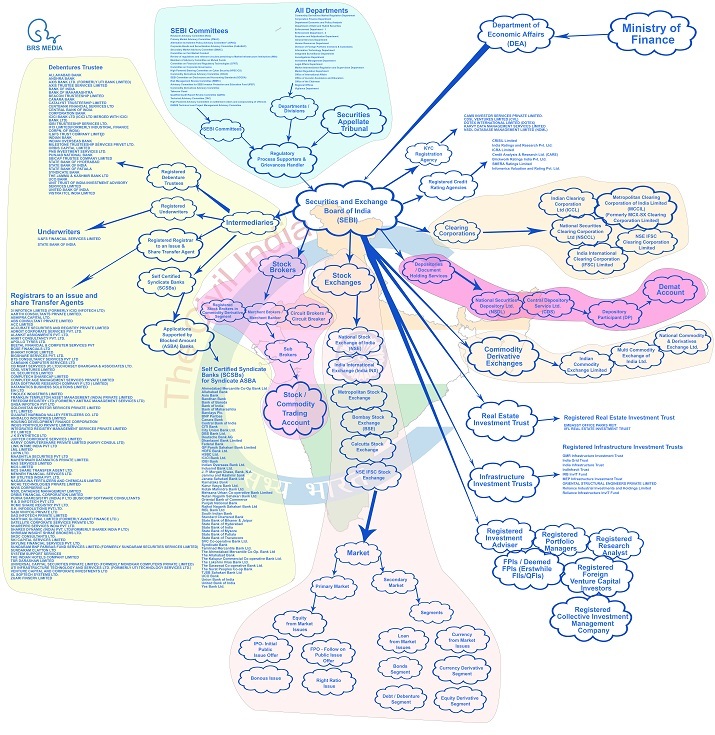
 Data Structure
Data Structure Networking
Networking RDBMS
RDBMS Operating System
Operating System Java
Java MS Excel
MS Excel iOS
iOS HTML
HTML CSS
CSS Android
Android Python
Python C Programming
C Programming C++
C++ C#
C# MongoDB
MongoDB MySQL
MySQL Javascript
Javascript PHP
PHP
- Selected Reading
- UPSC IAS Exams Notes
- Developer's Best Practices
- Questions and Answers
- Effective Resume Writing
- HR Interview Questions
- Computer Glossary
- Who is Who
SEBI: Objectives and Functions
Introduction: What is SEBI?
The Securities and Exchange Board of India (SEBI) is the regulatory body that manages and oversees the securities market in India. SEBI was established on April 12, 1988, as an autonomous and statutory body, under the Securities and Exchange Board of India Act, 1992.
SEBI's primary goal is to keep the securities market fair. So, it primarily protects investors from unfair practices and promotes the development of the securities market in India. SEBI works as a watchdog that formulates rules and regulations and ensures their implementation to keep the securities markets fair and transparent.
Structure of SEBI
The Securities and Exchange Board of India (SEBI) follows a well-defined organizational structure.

Here is an overview of its structure
Chairman Appointed by the government of India, the Chairman is the head of SEBI and is responsible for offering strategic direction and leadership to the organization.
Board of Directors The Board of Directors consists of various members, such as the Government of India, Reserve Bank of India (RBI)'s representatives, and independent members. The Board of SEBI is a powerful section that is responsible for making regulatory decisions, formulating various policies, and overseeing the good functioning of SEBI
-
Department SEBI has numerous departments that work on different aspects of its regulatory functions.
Some of the main departments of SEBI include
Legal Affairs Department It handles various legal matters, provides legal suggestions and advice, and assists in formulating regulations and guidelines.
Enforcement Department The Enforcement Department is another powerful department that investigates violations of securities laws, initiates enforcement actions, and attaches penalties or imposes legal actions against violators.
Market Intermediaries Regulation and Supervision Department It regulates and supervises numerous market intermediaries such as sub- brokers, stockbrokers, depositories, and their custodians
Corporation Finance Department This Department regulates and supervises listed companies, including their corporate disclosures, corporate governance practices, and compliance with legal listing procedures.
Investment Management Department This department regulates and oversees mutual funds, asset management fiorms, and various other collective investment schemes.
Market Regulation Department The Market Regulation Department looks at market activities, overseeing stock exchanges, and ensuring compliance with trading and listing procedures.
Investor Education and Protection Department This department's responsibilities include educating the investors, grievance redressal mechanisms, and taking measures to protect the investors.
Regional Offices There are many regional SEBI branches located in major cities across India. These offices work as local centers for SEBI's inspections, operations, and investor services. They facilitate interaction and coordination among the market participants and investors in their given locations.
Committees and Panels SEBI has the power to form various committees and panels, both internally and externally. These committees and panels can propose regulatory changes, advise on specific issues, and provide expert opinions. These committees usually consist of SEBI officials, industry experts, and stakeholders.
Key functions of SEBI
SEBI has numerous functions and powers to implement them, including
Registering and Regulating market participants in the securities market, which includes investment advisors, stockbrokers, sub-brokers, and mutual funds.
Regulation of the stock exchanges and other market intermediaries.
Promotion of fair practices and prevention of unfair and fraudulent trade practices in the securities market.
Prohibition of insider trading and regulation of takeover of companies and the substantial acquisition of shares.
Investigating and inspecting to make participants comply with securities laws.
Oversee and regulate the functioning of collective investment schemes, such as mutual funds.
Educate and inform investors about their rights and responsibilities.
Provide the investors with the necessary information required to make informed investment decisions.
Regulate and inspect the credit rating agencies and monitor their activities.
Frame rules and regulations for listed companies and provide guidelines, including corporate governance standards, disclosure requirements, and continuous listing obligations.
SEBI plays a crucial role in maintaining investor confidence, promoting market integrity, and facilitating the growth and development of the Indian securities market.
Objectives of SEBI
The main objectives of the Securities and Exchange Board of India (SEBI) are
Investor Protection
SEBI helps the investors of the securities market by making the market conditions fair and transparent. It creates an environment in the markets where investors can make informed and analytical decisions and have faith in the integrity of the market.
Regulation and Development of Securities Market
SEBI's other objective is to develop and regulate the securities market in India. It has the power to formulate rules, regulations, regulations, and guidelines. This is applicable to the market participants such as stock exchanges, brokers, sub- brokers, and other intermediaries, to make sure that rules are being obeyed by the participants and the markets function normally.
Promoting Fair Practices and Preventing Fraud
Promoting fair practices and preventing fraudulent and unfair trade practices are two major objectives of SEBI. It stops insider trading, fraudulent scheme, and market manipulation, that may harm investors or undermine market integrity.
Fostering Market Efficiency and Transparency
SEBI works towards creating an efficient and transparent securities market by promoting disclosure requirements and corporate governance standards for listed companies. It encourages timely and accurate dissemination of information to enable investors to make informed decisions.
Regulating Intermediaries
SEBI regulates various intermediaries operating in the securities market, such as stockbrokers, sub-brokers, merchant bankers, investment advisors, and credit rating agencies. It sets registration requirements, imposes obligations, and monitors their activities to ensure compliance with regulatory norms.
Promoting Investor Education and Awareness
SEBI aims to educate and create awareness among investors about their rights, responsibilities, and risks associated with investing. It provides information and conducts investor education programs to enhance financial literacy and empower investors to make informed investment decisions.
Regulating and Developing Mutual Funds
Mutual funds in India are also managed and overseen by the SEBI. SEBI formulates the regulations and guidelines for mutual funds, monitors their way of functioning, and protects the interests of investors in these funds.
Conducting Research and Surveillance
SEBI also conducts research, on behalf of the participants to conduct market surveillance and data analysis. This is done to identify potential risks, monitor market trends, and take proactive measures to safeguard investors and keep the market integrity intact.
In general, SEBI's objectives are meant for market regulation, investor protection, market development, and transparency. It works with the goal of creating a fair, vibrant, and competitive securities market in India.
Conclusion
It is SEBI that creates a healthy atmosphere in the securities market. It is impossible to think about a security market without the intervention and assistance of SEBI in India. It is one of the most important economic and financial institutions in India and has enough share in the progress of securities trade in the country.
FAQs
Qns 1. What is SEBI? When was it established?
Ans. The Securities and Exchange Board of India (SEBI) is the regulatory body responsible for overseeing and regulating the securities market in India. It was established on April 12, 1988, as an autonomous statutory body, under the Securities and Exchange Board of India Act, 1992.
Qns 2. Mention any two objectives of SEBI.
Ans. Two objectives of SEBI are Investor Protection, and Regulation and Development of Securities Market.
Qns 3. What is the institution that deals with securities market participants, such as stockbrokers, sub-brokers, investment advisors, and mutual funds?
Ans. SEBI regulates and registers participants in the securities market, such as stockbrokers, sub-brokers, investment advisors, and mutual funds.

